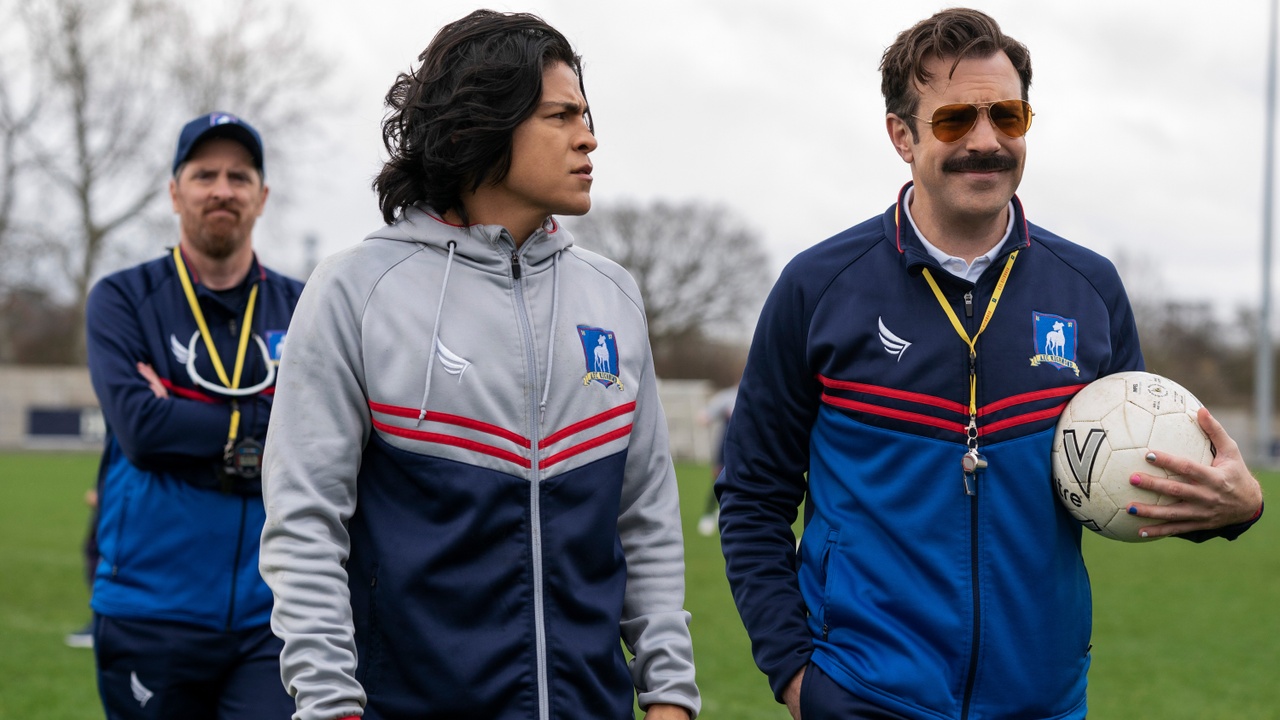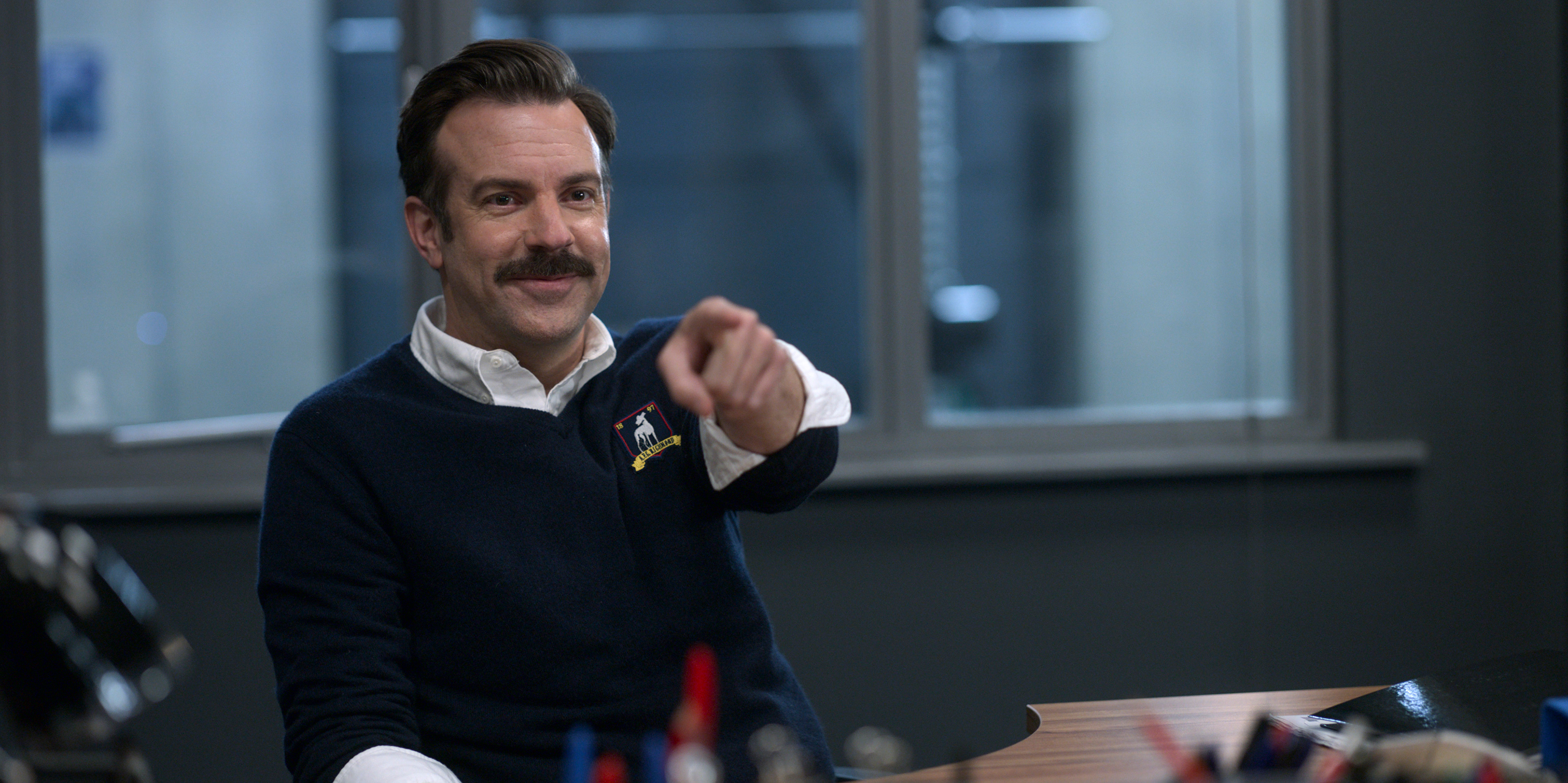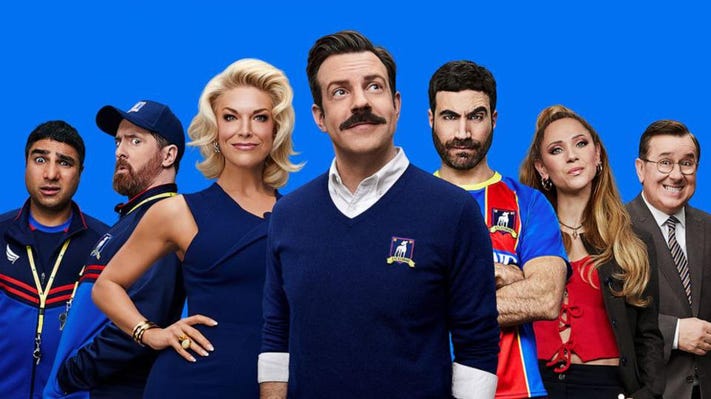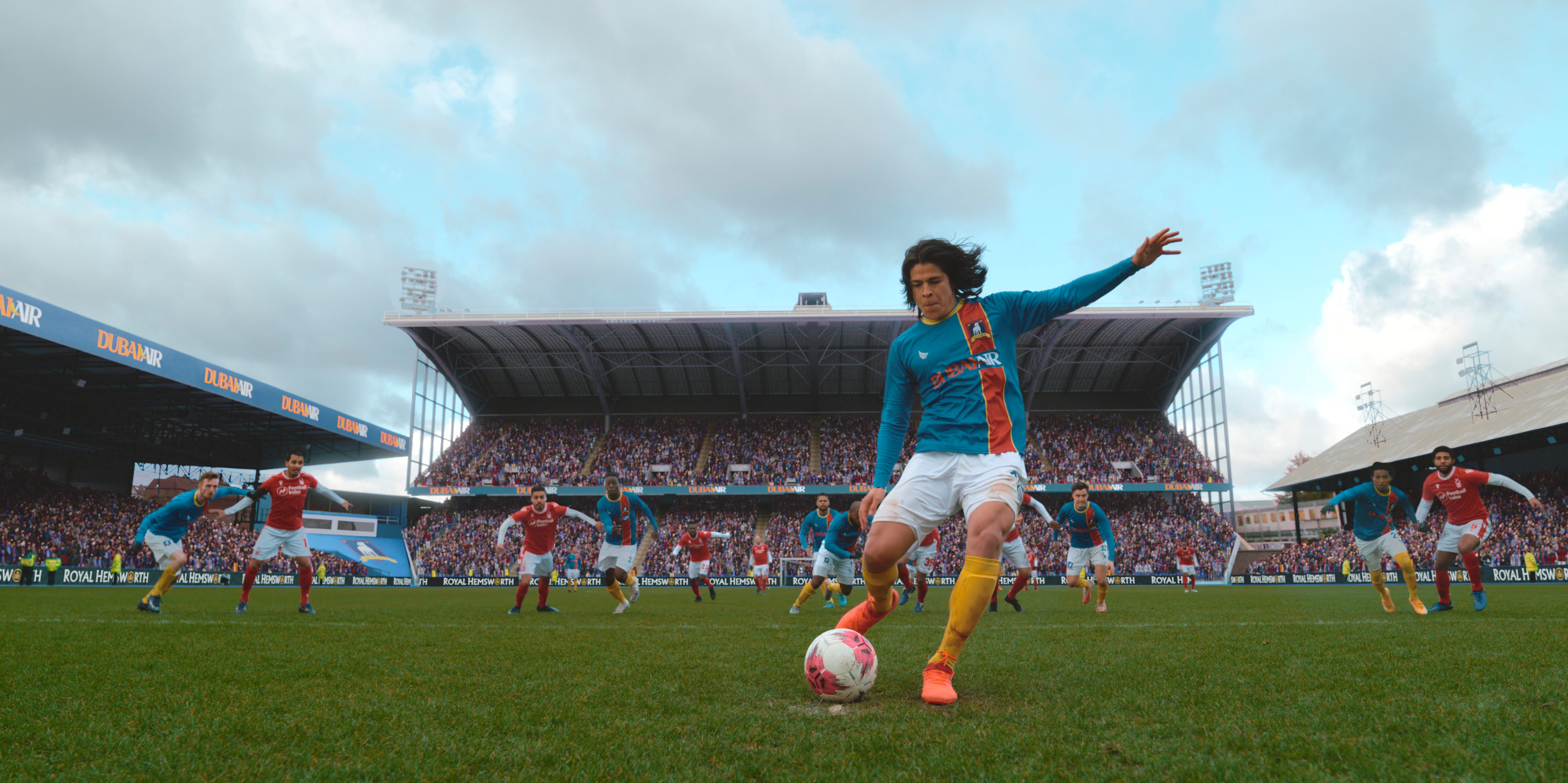Meet the Emmy-nominated Editor Melissa McCoy, ACE and Emmy-winning Editor AJ Catoline, ACE, of "Ted Lasso"!

Last month we spoke with Emmy-nominated Editor Melissa McCoy, ACE, and Emmy-winning Editor A.J. Catoline, ACE of the smash hit "Ted Lasso." Go behind the scenes with these super talented editors!
Melissa McCoy, ACE, first fell in love with filmmaking, and editing specifically, while a student at Western Michigan University. She then made her way to California and earned a Master’s in Editing from Chapman University Dodge College of Film & Media Arts. In 2007 she earned a coveted internship with ACE, which jump-started her career. In addition to "Ted Lasso," Melissa has also edited "Life Sentence" for the CW and the action-comedy series, "Whiskey Cavalier" on ABC.
A.J. Catoline, ACE, is from Cape Cod, Massachusetts and is a graduate of NYU’s Tisch School of the Arts and USC’s Master of Professional Writing Program. He serves on the Board of Directors of The Motion Picture Editors Guild and is a regular contributor to CineMontage Magazine. In addition to "Ted Lasso," his picture editing credits include "Speechless" (ABC), "Brockmire" (IFC) and "Black Jesus" (Adult Swim).
Gordon Burkell (GB) - This week, I'm joined by Melissa McCoy, and A.J. Catoline, the editors of the hit TV series, "Ted Lasso." When I watched the first season, the thing that stood out for me was the character development and character arcs. When you're editing you get different takes with variations on the delivery, how did you guys help mold these characters? Were there things that changed or evolved in the editing process?
Melissa McCoy (MM) - I think it was a discovery process for us for sure. When both of us came in, we weren't sure what the episodes were going to be. We had little glimpses. We had episodes one and two script wise when we started, but then when we started watching the performances, and seeing all the little nuances that the characters were doing the look that they were giving one another, the kind of the energy on set. They were discovering things in their scenes. And you could see, for example, when Jason would come in and say, “Okay, do a movement like this to sell this joke”, you could see all the work that they were doing. It really informed us as we were going. The characters deepened as they went along and they deepened for us as well. We just got more and more shades of backstory, and then when Jason came back from filming and worked with us, he gave us all these little nuggets regarding where he drew from the characters and what their motivations were and that helped us even further in the editing process. So it was really a discovery process over the whole season. When we got to the end of it all we had all episodes open so if we discovered something in one of the later episodes we could go back to an earlier episode and delve into that scene or that moment to try to build to a moment later on in the season.

AC - I'll tell the fans out there who are annoyed why the show is dropping all at once. If we had dropped all three episodes, we wouldn't have been able to give you an episode six. And we would have been dark because we're still just finished picture locking the finale, Episode 12. Last week, we're still a lot of visual effects in the show. We do not play soccer in front of a real stadium of screaming football fans. It is all added in visual effects by an amazing team. The sound team needs to work on it to bring you the full sound so that's why they're coming piecemeal. Standby you'll be able to stream them all at once very soon.
MM - Lots of people are working very hard to bring them to life. We want to release them all, but because we love them so much they need a little polish.
GB - You are both nominated for Emmys. Is there a scene or a moment that you think really stands out? What made it something you're so proud of?
MM - Episode seven is really a special one to me, Jason wrote that one and there's just so much going on. Sassy, Rebecca and Kaylee have their girls weekend. The guys are on their trip for the team. The away game where they've never beat these guys. So that's the setup. And amongst all that, Ted's dealing with signing divorce papers, and Keeley and Roy had their spark going. Then we meet Sassy, who's from Rebecca's past and that kind of sets the whole show in Motion. We have the scene in the locker room where Nate gives the motivational speech. There is so much in that scene. First of all, Hannah singing live is amazing. Then I had to build in Ted where something's not right with Him amongst this whole karaoke scene where Rebecca is coming into her own and you see a little bit of light of Rebecca's past of who she really is.She's got a lot of joy in her. Building that whole sequence with Rebecca singing and the team, kind of enthralled with her and amongst all this joy happening, we build in the sound design of Ted's panic attack starting and you see something's kind of going wrong. I put in a lot of jump cuts, you know, jump cut him out of the room, out of the bar. In post we added a visual effect to his footage, where we added the trails behind him, getting him out of that bar. Because we didn't have a ton of footage and we wanted it to feel like you don't know how long he's been out there suffering. At the end of that Rebecca is there to help him. So she's been singing and then she's out with him. I wanted to build that feeling that this could have been 10 minutes or he’s been out there and she's finished her set and came out and found him. That was a big set piece and a big pivotal moment I felt for the season and the episode that I needed to get right. So that was one I'm particularly proud of because all the juggling of all the pieces to put it together was a fine dance and everybody's performances were so amazing. There was also so much with the sound design and the visuals.There was just a lot going on and in such a small compact timeframe.

GB - When I think back to it, you don't cut to a reaction shot of anyone seeing him leave. He gets up and goes.
GB - You made Apple cry IS what you're saying?
AC - Yes, I made Apple Executives cry.
GB - Are the shooting of the soccer scenes against LED walls at any point? Or are the VFX more post composited?
GB - Is there a scene that you left on the cutting room floor that was especially hard to cut?
AC - The writers were really judicious in writing the show. If you had producers who wanted to rush the show we probably would have done what we could to get the runtimes down. In the case of Jason and Bill Lawrence just having the vision and the confidence to know, we have a beautiful story here. Let's tell it, we put it all in and the shows are 34 minutes long. Nothing really left on the cutting room floor. Bill Lawrence is a master.
MM - I remember Jason would say, I'm gonna remember that joke for season two. It's a good joke, but it just doesn't work for the moment. I think that we got the episodes exactly where they needed to be. And so there really weren't any scenes cut.
GB - How long do you get for each episode to cut?
MM - We've been pretty lucky on this show. It's not like the typical network schedule, we kind of have a little bit of a luxury, but it's not because they block shoot the episodes, but then every once in a while they don't block shoot. So for season two, for example, I cut one, three and five, but four went after five. So there was a period where I was in dailies forever, it just didn't stop. Some days you don't get a lot of dailies, some days, you get a ton of dailies. So we got a little bit of a luxury in our editor cut days, just because we were never out of dailies. Things were coming in at different times. So it fluctuates. As the episodes grow bigger, they grow more complicated, we just needed a little bit more time. So every once in a while, we have an extra day to polish and get things together. So we were definitely grateful to Apple. I mean, we still have delivery dates, but there's some flexibility.

AC - I was gonna say you say there's two of us. And there's also our two assistant editors who are not with us on this call, but I will shout them out. Alex Szabo and Francesca Castro, we wouldn't be able to do it without them. And we have a visual effects editor this year. Frank, who's amazing, it really helped us out. We have a music editor Richard Brown who is nominated. So we have a lot of other people who really help us out with the schedule, which was tighter this year. We worked on Ted last season for about 10 months and did 10 episodes and this year, we've done 12 episodes in about seven months. Soccer is like editing, it's a game collaboration. And then because we've jelled and know each other, well, we were able to do more, faster. Traditionally, the editor has to get it together in about eight days, we kind of bounced around working on multiple episodes, and they have been very lenient with us. And then when we get in with Jason, he tries to get it done with us in about three to four days. He saves it, he always comes in, right up to the end of the deadline. He's like, well, that's what you get for working with an SNL guy. He's gonna tell you, we're gonna do it live, he's gonna take us right up to the very edge.
MM - And he's wearing so many hats too! He's doing press, and he was writing and acting, and then also doing notes. I mean, I would get 20 minutes with him on zoom when he was in his trailer in London of just broad thoughts and things. So, talk about a man of many trades. He really has the "Ted Lasso" vision for all three seasons in his brain and he is the keeper of a lot of secrets and ideas. He’s integral to the whole show. So it's really special in that way that brain trust is like the star of the show. It's a blessing and a curse. I think probably for him, but he has to be so involved, but the show itself is so elevated because of it.
AC - It's entirely his vision in his head. Working with Jason, he has this amazing vision and you're trying to help him get the vision out of his head onto the screen and that's a great collaboration to be in. He loves the term movie magic. You know what movie magic can we do to make this moment play better? And so we talk with him about the tools we have as editors,
with sound and music. When we're trying to get the shots to come together, we're splitting a lot of frames, where one side of it is a different reaction than the other side. And there's a lot of invisible work. Editing is an invisible art. I want to give a shout out to all the team on our show who make this come together.
GB - I have one last question for you guys. We've been stuck in this pandemic for quite a while and depending on where you are in the world, you might be stuck inside. So is there a show or movie you've discovered over the last year that you think people should check out?
MM - I just finished "Mythic Quest." It's set in the video game world but it's really kind of a dichotomy of film, a film set, as well as all the production, egos and attitudes that go into it. We really enjoyed that one. But the other one we really enjoy is Netflix, “The Movies That Made Us”. If you're looking for something that feels good and that will take you back to your childhood and I guess if you're of a certain age. They had a Back to the Future one And now I'm showing my son Back to the Future. It's just fun to look back at all the drama and the special magic that comes with those films that you love.
AC - I'm a big fan of Aaron Sorkin and so is Jason and we bonded over that. He loved "The West Wing." I went back and watched old West Wing episodes, and "The American President," I think it was the 25th anniversary of that film during the pandemic. I liked watching a more positive vision of American politics. That resonated with me. Ted is the opposite of the ugly American, he goes over to England with such hope. So going back and watching some of "The West Wing" episodes gave me some hope and inspiration that we can all get along. I would also recommend “Goodwill Hunting” too. It is such a great one to watch, especially in these times where mental health is so important.

